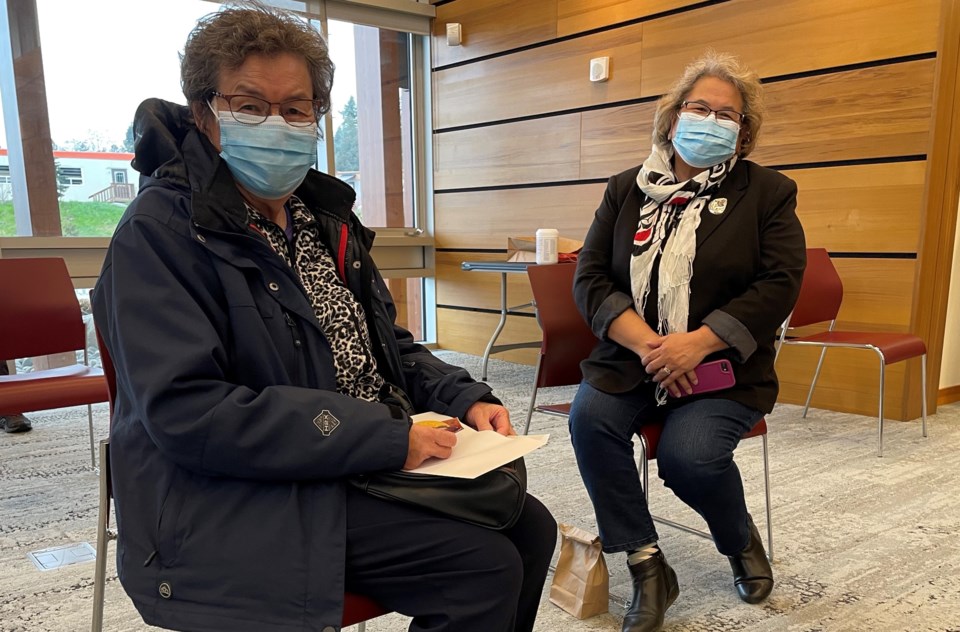Tsleil-Waututh Nation can relax a little now knowing all its members have received their first COVID-19 vaccination, taking them a step closer to their goal of community immunity on their North Vancouver reserve.
Members were all smiles on Thursday [March 25] at Tsleil-Waututh’s third vaccination clinic, where the final people in the 614-member population, on and off Burrard Inlet reserve, received their first vaccine doses. A total of 681 people have now been vaccinated over the course of the clinics, starting with Elders and vulnerable members. Tsleil-Waututh also ensured vaccinations were available to its essential workers, health-care professionals, administration staff and teachers as part of its “whole community” approach to vaccinations.
“Considering we're all working in the same physical space we wanted to ensure that everybody is protected,” Andrea Aleck, director of health for Tsleil-Waututh Nation said.
Aleck said there was a sense of “pure joy” as community members came to receive their immunizations over the three clinics.
“The community is extremely relieved,” she said, adding it was also a very emotional time for many members, especially Elders.
“When we had the Elders clinic [about three weeks ago], it was the first time a lot of them have seen each other in a year, so to be able to be in a room together was really quite moving, and you could really feel it in the air and there was a lot of laughter and just joy in being in one another's company.”
Important to create a sense of 'safety and security'
Given the history of Indigenous-specific racism and discrimination in British Columbia’s health-care system, which is addressed in the In Plain Site report, Aleck said it was crucial First Nation communities were able to offer on reserve vaccination clinics and foster a sense of safety and trust.
She said being able to do this was why their vaccination numbers were so successful – and they have been able to keep case numbers low.
“It was really important that we created a real sense of safety and security and provided a culturally appropriate environment for our community members to receive the vaccination without any sort of discrimination or racism,” she said
“When we create that space, that opportunity in their own environment, and they know that they're going to be cared for and respected, and be treated with dignity, then we're going to have more positive outcomes.”
Aleck said she had been advocating from day one for a “whole community” approach to the vaccinations.
“We are an entire community here that live and reside together and the reason why having an outbreak in our community would be so detrimental is because we all know one another, we all reside in the community together and our greatest strength is our reliance and our interconnectedness with one another.
“That's why it's so important to get our community vaccinated.”
'Our greatest strengths can be our greatest weaknesses'
With all the rules in place, she said it had been a tough year for community members because not being able to visit their friends and family, “really takes away from people's spirit and that connectedness with one another.”
“We are such a strong community and our teachings are to help and support one another,” Aleck said. “That's exactly why our greatest strengths during a pandemic can be our greatest weakness.”
Aleck added the clinics were not only a wonderful experience for their own health staff but for the Vancouver Coastal Health staff who worked alongside them.
“We had a welcoming prayer song and we gave the VCH staff blankets in honour and recognition of their hard work and the good feelings of the work that we had that day,” she said, explaining that back in traditional times, Tsleil-Waututh didn't have monetary denominations to hand out, so they honoured people with woven blankets.
For now, Aleck said the community would continue to follow provincial health officer guidelines and restrictions and were “just really looking forward to the second dose.”
Elisia Seeber is the North Shore News’ Indigenous and civic affairs reporter. This reporting beat is made possible by the Local Journalism Initiative.



